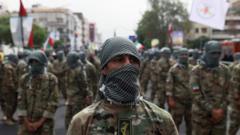Reports from Western intelligence agencies indicate an alarming rise in Iranian plots to kidnap or assassinate dissidents and journalists, with evidence suggesting that criminal gangs, like those led by Naji Sharifi Zindashti, are being enlisted for these operations. These unsettling tactics underline Iran's desperate measures in evading accountability for its actions on foreign soil.
Iran's Covert Operations: Criminal Gangs Engaged in International Hit Jobs

Iran's Covert Operations: Criminal Gangs Engaged in International Hit Jobs
New court documents reveal that Iran is allegedly utilizing criminal organizations to execute assassination plots abroad, raising concerns over rising threats against political adversaries.
Iran is currently at the center of a chilling narrative involving the use of criminal organizations to orchestrate assassination and kidnapping plots against dissidents and political adversaries abroad. Recent court documents highlighted by Western intelligence agencies expose the alarming extent of these operations carried out by the Iranian regime, particularly the Islamic Revolutionary Guard Corps (IRGC).
Intelligence investigations indicate a significant upsurge in reported plots since 2022, with targets including journalist dissidents and political foes residing outside Iran. One notable incident involves the alleged intention to attack the Israeli embassy in London, prompting multiple arrests of Iranian nationals in the UK.
Key findings from documents sourced from Turkey and the US suggest that Iranian authorities have been engaging criminal networks to execute these offensive operations. A prominent figure emerging from these reports is Naji Sharifi Zindashti, an Iranian mob leader with purported ties to drug smuggling who has been linked to high-profile assassinations. His involvement in the 2017 murder of Saeed Karimian, a television executive, marked a significant point in the escalating violence associated with the Iranian regime's political opponents.
Zindashti's legal troubles in Turkey grew when he was arrested for his alleged role in Karimian's death but was controversially released, only to flee to Iran shortly after, raising suspicions of state collaboration. Investigators have suggested that there exists an intricate connection between organized crime and Iranian intelligence, corroborated by Cengiz Erdinc, a Turkish journalist specializing in the nexus between crime syndicates and state security operations.
Notably, Zindashti's name surfaced again in connection with the forced abduction of Iranian dissident Habib Chaab and a foiled assassination plot against Iranian dissidents in Maryland, highlighting the regime's international reach and willingness to resort to extreme measures against dissent.
The IRGC's Quds Force has been implicated in establishing a global terrorist infrastructure through collaborations with criminal organizations such as the Thieves-in-Law, a notorious body linked to various criminal activities across the globe. Just recently, members of this gang were convicted on charges of plotting the assassination of an Iranian-American activist in New York, driven by a staggering offer of $500,000 for their killing.
As tensions have escalated following the US assassination of major IRGC commander General Qasem Soleimani, Iranian attempts to target former US officials have intensified, with chilling claims of plots against key figures like former President Trump.
In recent years, police in the UK have reported over twenty credible threats stemming from Iranian operatives, with specific cases involving infiltration procedures by Iranian agents aimed at gathering intelligence on critics. The persistence of these efforts exemplifies Iran's strategy of utilizing third-party criminal elements to carry out its operations, thereby distancing itself from direct responsibility.
Experts believe that as mechanisms of organized crime are systematically integrated with Iranian state activities, combating these threats poses significant challenges to law enforcement agencies worldwide. The situation demands international attention amidst an emerging landscape where crime and politics become dangerously intertwined in a bid to silence dissent.





















